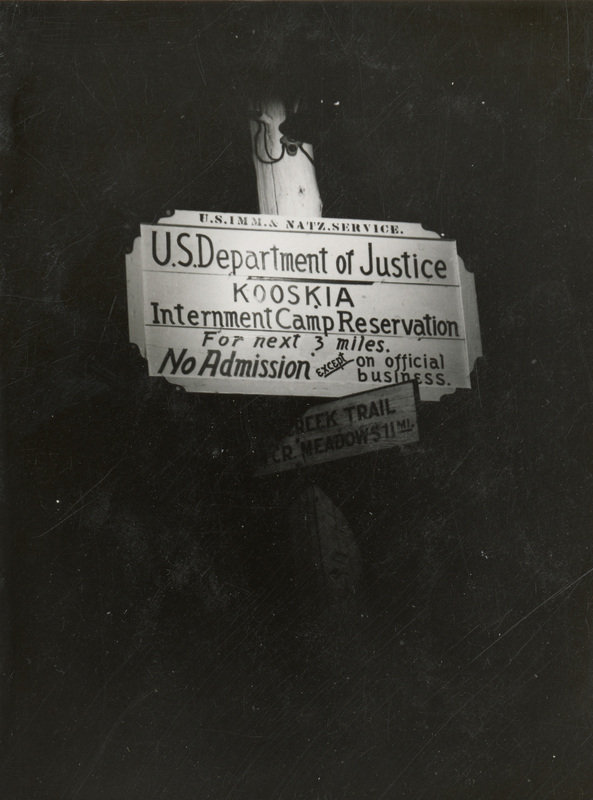Kooskia Internment Camp Scrapbook
Documenting the daily life of Japanese Americans incarcerated by the US Government near Kooskia, ID during World War II
*The below is adapted (with permission) from the Asian American Comparative Collection’s website, written by Dr. Priscilla Wegars.
Contents: About the Camp | About the Scrapbook | For More Information | Tech
ABOUT THE CAMP
The Kooskia (pronounced KOOS-key) Internment Camp is an obscure and virtually forgotten World War II detention facility that was located in a remote area of north central Idaho, 30 miles from the town of Kooskia, and 6 miles east of the hamlet of Lowell, at Canyon Creek. The camp was administered by the U.S. Immigration and Naturalization Service (INS) for the U.S. Department of Justice. It held men of Japanese ancestry who were termed “enemy aliens,” even though most of them were long-time U.S. residents.
Although there were a number of Justice Department internment camps throughout the United States during WWII, the Kooskia Internment Camp was unique in that its inmates volunteered to transfer there from other camps and received wages for their work. A total of some 265 male Japanese aliens occupied the Kooskia Internment Camp at various times between May 1943 and May 1945. Although some internees held camp jobs, most worked construction on a portion of the Lewis and Clark Highway (now US 12) between Lewiston, Idaho, and Missoula, Montana, that ran parallel to the wild and scenic Lochsa River.
The Japanese internees at the Kooskia camp came from 23 states (Alaska, California, Colorado, Connecticut, Florida, Hawai’i, Idaho, Illinois, Kentucky, Louisiana, Maryland, Massachusetts, Minnesota, Montana, Nevada, New Jersey, New York, Ohio, Oregon, Pennsylvania, Texas, Utah, and Washington). They included Reverend Hozen Seki, founder of the New York Buddhist Church; Toraichi Kono, former employee of Charlie Chaplin; and Japanese Latin Americans kidnapped from their respective countries, chiefly Peru, by U.S. government agencies.
Dr. Wegars’ research has uncovered INS, Forest Service, Border Patrol, and University of Idaho photographs and other records. These, combined with internee and employee oral and written interviews, illuminate the internees’ experiences, emphasizing the perspectives of the men detained at the Kooskia Internment Camp.
ABOUT THE SCRAPBOOK
The Kooskia Internment Camp Scrapbook is a hand-made manuscript consisting of 148 photographs (and two drawings) of activities and buildings related the Kooskia Internment Camp.
In 2005, the son of one of the camp’s now-deceased guards discovered the scrapbook among family memorabilia and offered it to the University of Idaho. Consequently, the scrapbook was purchased by the University of Idaho Library with financial assistance from the Library Associates, a friends group.
The scrapbook is located at the University of Idaho Special Collections & Archives and cataloged as Photograph Group 103.
For More Information
Wegars, Priscilla. Imprisoned in Paradise: Japanese Internee Road Workers at the World War II Kooskia Internment Camp. Moscow, Idaho: Asian American Comparative Collection, University of Idaho, 2010.
Wegars, Priscilla. “Japanese and Japanese Latin Americans at Idaho’s Kooskia Internment Camp,” Guilt by Association: Essays on Japanese Settlement, Internment, and Relocation in the Rocky Mountain West, Ed. Mike Mackey. Powell, WY: Western History Publications, 2001, pp. 145-183.
The University of Idaho Library also holds an internment camp diary written in Japanese.
The Shitamae Family Letters Digital Collection contains letters from the Mindioka Incarceration Camp.
Technical Credits - CollectionBuilder
This digital collection is built with CollectionBuilder, an open source framework for creating digital collection and exhibit websites that is developed by faculty librarians at the University of Idaho Library following the Lib-Static methodology.
Using the CollectionBuilder-CSV template and the static website generator Jekyll, this project creates an engaging interface to explore driven by metadata.

